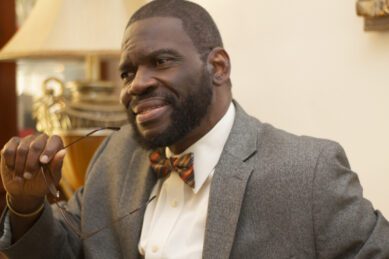Democracy & Governance
Addressing Sexual Violence – Beyond Body Parts and Toward Effective Strategies for Reducing Sexual Violence -By John Egbeazien Oshodi
Justice Wike’s proposal for amputation, although aiming to deter sexual violence, might not entirely curb impulsive urges. Additional strategies, including rehabilitation programs, therapy, education, and societal awareness, are vital to comprehensively address the complex issue of sexual violence. These multifaceted solutions create a safer environment for everyone and pave the way for a society free from the scourge of sexual violence.

In Channels news of October 24, 2023, by Charles Opurum, the article titled ‘Justice Eberechi Wike Advocates Amputation For Sex Offenders’ highlights Justice Eberechi Wike’s strong advocacy for more drastic punishment for individuals found guilty of defiling minors. Speaking at the 2nd National Conference of Family Court Judges, Magistrates, and other Family Court Practitioners in Port Harcourt, Justice Wike argued that the current punishments, such as life imprisonment or a 14-year jail term, are not severe enough to deter potential sexual offenders from harming children.
Justice Wike proposed the amputation of body parts used by offenders in the act of defiling minors, whether it be fingers, mouth, or private parts. She believes that such a harsh penalty would make potential offenders think twice before committing such crimes. She expressed her hope that a legislator in the House of Representatives or Senate would sponsor a bill advocating for this kind of punishment.
In the realm of defining rape, it stands as a criminal offense, involving non-consensual sexual penetration or intercourse, underscored by the use of force, coercion, or manipulation to engage another person in sexual activity without their explicit and voluntary consent. This violation often encompasses physical force, threats, intimidation, or the victim’s incapacitation due to substances like drugs or alcohol, leaving them unable to give informed and voluntary consent. The aftermath of rape goes far beyond legal repercussions, inflicting profound emotional and psychological trauma on survivors, impacting their sense of safety, self-worth, and trust in others. Survivors often grapple with intense emotional pain, fear, shame, and anxiety, potentially leading to long-term psychological distress and post-traumatic stress disorder (PTSD). This pain, both physical and emotional, resulting from rape, is not merely immediate but can persist for years, affecting various aspects of the survivor’s life, including relationships, work, and overall well-being.
In the context of children, the definition of rape remains consistent: it involves non-consensual sexual penetration or intercourse. Due to their age and inability to comprehend the implications of such actions, children are legally incapable of providing consent. Any sexual activity involving a child, regardless of apparent consent or circumstances, is considered rape or sexual assault. Beyond legal consequences, these heinous crimes inflict significant emotional and psychological trauma on survivors, necessitating comprehensive support systems to address their pain and aid in their recovery.
Understanding the causes of sexual violence and rape reveals their complex and multifaceted nature, often intertwining biological, psychological, social, and environmental factors. Importantly, no single factor can fully explain why someone becomes sexually violent or a rapist, with individual motivations varying widely. Some potential factors contributing to sexual violence include a history of abuse or trauma, mental health issues, substance abuse, distorted attitudes and beliefs about gender and relationships, a lack of empathy, power and control issues, impulsivity, social isolation, and exposure to violent or sexually explicit media.
In the realm of legal consequences for sexual offenses, penalties vary across jurisdictions and are contingent on specific laws in place. Possible punishments encompass imprisonment, fines, probation, mandatory counseling or therapy, and the requirement of sex offender registration. In some cases, more extreme measures such as chemical or surgical castration might be implemented. Chemical castration involves the administration of antiandrogen drugs, such as cyproterone acetate, flutamide, or gonadotropin-releasing hormone agonists.
These medications are designed to reduce testosterone, hormones, and other chemicals that fuel libido, thereby diminishing sexual urges and desires. This is achieved through drugs that suppress these physiological factors, rather than through a surgical procedure. Surgical castration, on the other hand, refers to the physical removal of an individual’s genitals or reproductive organs, typically the testicles in males. This procedure, akin to physical castration, aims to diminish the production of sex hormones, including testosterone, by directly removing the organs responsible for their secretion. Surgical castration may also involve the cutting of the penis or the complete removal of the testicles, depending on the extent of the procedure.
In recent years, there has been a growing acknowledgment of the importance of rehabilitation and support for offenders to address the underlying causes of their behavior and prevent future offenses. Treatment programs, such as cognitive behavioral therapy and other therapeutic interventions, are designed to assist individuals in comprehending and managing their impulses, fostering healthier attitudes and behaviors towards others.
The controversies surrounding the treatment of survivors highlight the imperative for a range of approaches. These encompass chemical and surgical interventions, like chemical castration, alongside non-invasive methods such as electronic monitoring, cognitive behavioral therapy, spiritual counseling, and various therapeutic techniques. The ongoing debate underscores the crucial need for suitable punishment for perpetrators, emphasizing the pivotal role of the legal system in holding them accountable. However, comprehensive support that includes psychological, emotional, and social assistance becomes paramount in aiding survivors as they navigate the complex aftermath of rape and sexual assault. Recognizing the intricate interplay of legal, medical, and therapeutic interventions in addressing these heinous crimes, holistic support emerges as a vital component in the recovery process.
In the United States of America, incarceration and civil commitment programs are strategies employed to prevent sexual violence. These initiatives involve long-term imprisonment and post-sentence confinement of individuals identified as sexually violent predators.
While these measures are intended as deterrents and offer societal security, their effectiveness and ethical implications are subjects of ongoing debate. This debate raises crucial questions about individual rights, the potential for rehabilitation, and the long-term impact of these strategies on reducing sexual violence.
Integral to managing and rehabilitating individuals involved in sexual offenses are medical and psychological assessments, evaluating offenders’ mental states, identifying potential risk factors, and determining appropriate treatment and management strategies. These assessments provide valuable insights into the offender’s behavior, motivations, and potential for rehabilitation, allowing tailored interventions and evidence-based strategies to reduce sexual violence and promote long-term community safety.
Additionally, close-tight community control, probation, and long-term outpatient therapy play pivotal roles in managing and rehabilitating sexual offenders. Close-tight community control involves stringent supervision, restricting offenders’ movements and interactions, reducing opportunities for reoffending. Probation, an alternative to incarceration, allows supervised reintegration into society, coupled with compliance requirements such as therapy sessions and rehabilitation programs. Long-term outpatient therapy addresses underlying causes, promoting empathy and impulse control to mitigate the risk of reoffending over time.
Within correctional facilities, preventing sexual offenders from harming others, particularly vulnerable inmates, necessitates segregation, specialized units, comprehensive risk assessments, rehabilitation programs, staff training, confidential reporting mechanisms, increased supervision, and inmate awareness initiatives to foster a culture of respect and support, creating a safer environment for all.
In conclusion, Justice Wike’s proposal for amputation, although aiming to deter sexual violence, might not entirely curb impulsive urges. Additional strategies, including rehabilitation programs, therapy, education, and societal awareness, are vital to comprehensively address the complex issue of sexual violence. These multifaceted solutions create a safer environment for everyone and pave the way for a society free from the scourge of sexual violence.

John Egbeazien Oshodi
Professor John Egbeazien Oshodi, who was born in Uromi, Edo State, Nigeria, to a father who served in the Nigeria police for 37 years, is an American-based police and prison scientist and forensic, clinical, and legal psychologist. A sex offender assessment and treatment psychologist. A government consultant on matters of forensic-clinical psychological services in the USA; and a former interim associate dean and assistant professor at Broward College, Florida. The Founder of the Dr. John Egbeazien Oshodi Foundation, Center for Psychological Health and Behavioral Change in African Settings. In 2011, he introduced state-of-the-art forensic psychology into Nigeria through N.U.C. and Nasarawa State University, where he served in the Department of Psychology as an Associate Professor. He has taught at various universities and colleges including Florida memorial University, Florida International University, Broward college, Lynn University, and a contributing faculty member at the Weldios university in Benin Republic, Nexus International University, Uganda, Nova Southeastern University and Walden University in USA. He is a Human Rights Psychologist with a focus on African related environments. john.oshodi@mail.waldenu.edu


















